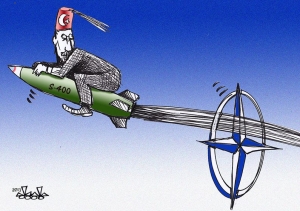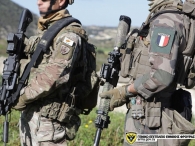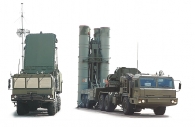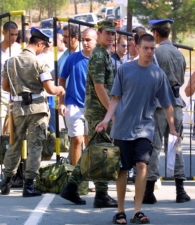The S-400 and the changing Turkish–American relations:
Geopolitical implications and concerns
The Washington Ankara controversy over the purchase of Russian S-400 anti-aircraft is probably one of the most critical issues dividing the US and Turkey, which will be a concern for the two countries throughout 2020 and beyond. Developments around this problem highlight the changing relations and roles in the region and their impact on the geopolitical landscape in the Eastern Mediterranean and the Middle East. Turkey projects itself as an active player in this area, while other actors, including Cyprus, are facing challenges to which they are bound to respond.
These are highlighted in the latest study by the head of the Cyprus Center for Strategic Studies, Dr. Aristos Aristotelous, under the title “ The S-400 and the Changing American-Turkish Relations: Geopolitical Extensions and Complications”.
Dr. Aristotelous points out that Turkey, aided by its rapid economic growth and significant strengthening of its armed forces over the last decades, is seeking the role and status of a big power in the region and beyond. It declares non-reliance on foreign centers but does not abandon NATO or cut off ties with the US. It is thus suggesting that it does not feel strong enough outside of the alliance to face potential challenges from its geopolitical opponents. At the same time, it acts in contradiction to the alliance’s security requirements and interests, following the case of the S-400 purchase from Russia.
Americans react strongly to Turkey’s stance and warn it with sanctions under CAATSA - in addition to being excluded from the F-35 program - but NATO’s General Secretary and Trump’s manipulations signal opposing messages. Considering Turkey as a “valuable” partner, make them seem predisposed to turn a blind eye to Turkey’s uncompromising attitude, at the expense of American laws and NATO’s common positions. This strategy aims at maintaining a working relationship with Ankara, by not pushing it in the arms of Russia as was threatening them. As a result, Turkey remains adamant about acquiring and deploying S-400, since the country estimates that the costs to be imposed by the United States will not be high enough to deter it.
Dr. Aristotelous underlines that the fear of Turkey cutting off ties with NATO and joining the rival Russian camp is groundless. Turkey’s conviction is as a great power to pursue an independent, “multidimensional” national policy rather than disengage from the United States and become Moscow’s dependent.
Dr. Aristotelous argues that Russia, despite seeking good relations and military cooperation with Ankara, thus undermining NATO and the US, has reservations about Turkey’s intentions as well. The two countries divide a bloody competitive past and national differences – smoothened down at present, but sooner or later, Turkish hegemonic aspirations, which extend to Caucasia and beyond, will affect vital Russian interests, provoking reactions in Russia.
As far as the future of the already overburdened with problems US-Turkish relations is concerned, the safest conclusion from their confrontation over the S-400 is: Whether or not the two partners come to terms with this issue, the blow to relations between them is a fact. Perceptions and attitudes towards each other will be different than before, and the US’s ability to control and exert influence over Turkey will be less effective.
The US, Dr. Aristotelous says, will, of course, continue to value Turkey as a “valuable” partner and try to keep it on an American-Nato trajectory. But, it will be less subtle towards it than before when its actions contradict US national security interests and the strategic arrangements they promote with other partners in the region to fill the gap in the relations with Turkey. But, while the Americans continue to appease Ankara, countries involved in the strategic cooperation axis with the US, which face threats from this “undisciplined ally” such as Greece and Cyprus, will doubt the extent and credibility which they expect to have from the US against claims from Turkey.
Finally, as regards Cyprus and its participation in this American strategic cooperation axis, the Government of Nicosia seems to be moving toward further deepening and institutionalizing its association with the US. At the same time, however, it continues to assure Moscow that it is not abandoning its “multi-layered” foreign policy, even though in practice, it is becoming more evident that it is promoting American national security strategy in the region. Such an approach may involve opportunities but also several risks. Under the circumstances, the challenge for the Republic of Cyprus is to figure out how it can satisfy both powers at the same time, without losses in the security field and the Cyprus issue.
16/01/2020






